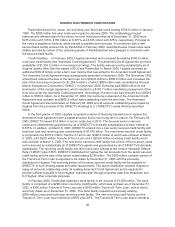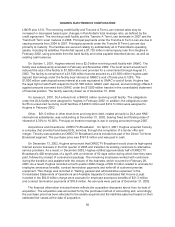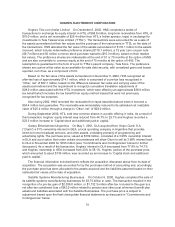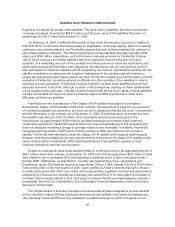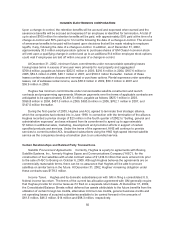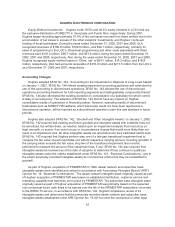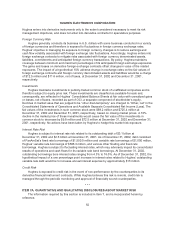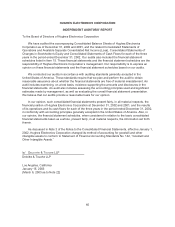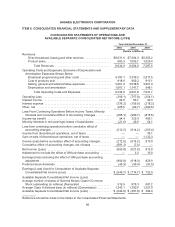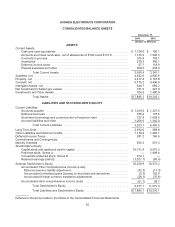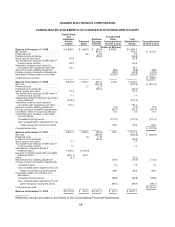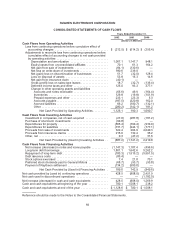DIRECTV 2002 Annual Report Download - page 69
Download and view the complete annual report
Please find page 69 of the 2002 DIRECTV annual report below. You can navigate through the pages in the report by either clicking on the pages listed below, or by using the keyword search tool below to find specific information within the annual report.HUGHES ELECTRONICS CORPORATION
Hughes adopted SFAS No. 141, “Business Combinations” on July 1, 2001. SFAS No. 141
required that all business combinations initiated after June 30, 2001 be accounted for under the
purchase method and prohibited the amortization of goodwill and intangible assets with indefinite lives
acquired thereafter. The adoption of SFAS No. 141 did not have a significant impact on Hughes’
consolidated results of operations or financial position.
Hughes adopted SFAS No. 133, “Accounting for Derivative Instruments and Hedging Activities,”
on January 1, 2001. SFAS No. 133 required Hughes to carry all derivative financial instruments on the
balance sheet at fair value. In accordance with the transition provisions of SFAS No. 133, Hughes
recorded a one-time after-tax charge of $7.4 million on January 1, 2001 as a cumulative effect of
accounting change in the Consolidated Statements of Operations and Available Separate Consolidated
Net Income (Loss) and an after-tax unrealized gain of $0.4 million in “Accumulated other
comprehensive income (loss).”
New Accounting Standards
In January 2003, the Financial Accounting Standards Board (“FASB”) issued FASB Interpretation
No. 46, “Consolidation of Variable Interest Entities—an interpretation of ARB No. 51” (“FIN 46”). FIN 46
requires the consolidation of affiliated companies where a controlling financial interest is achieved
through arrangements other than voting interests. Affiliated companies are considered variable interest
entities in instances where affiliate capital is insufficient to permit the affiliate to finance its activities
without additional subordinated financial support, and in certain other circumstances. The
determination as to whether an affiliate is a variable interest entity must be based on the circumstances
on the date that an entity becomes involved with an affiliate or when certain events occur that would
indicate a potential change in a previous determination. Consolidation of an affiliate is required when it
is determined that the affiliate is a variable interest entity and that the investor will absorb a majority of
the expected losses or residual returns if they occur. As required, Hughes will apply the provisions of
FIN 46 for all investments in affiliates after January 31, 2003. For investments in variable interest
entities made before February 1, 2003, Hughes will follow the provisions of FIN 46, as required, no
later than July 1, 2003. The adoption of this standard could result in the consolidation of certain
affiliates which were previously accounted for under the equity method of accounting. Such adoption
would be reflected as a cumulative effect of accounting change in the consolidated statements of
operations.
Hughes has identified the partially-owned local operating companies providing DLA programming
services in Venezuela and Puerto Rico, of which Hughes owns 19.5% and 40.0%, respectively, as
potential variable interest entities. Hughes currently accounts for these investments under the equity
method of accounting and reflects approximately 75.0% of their net income or loss in Hughes’
consolidated statements of operations due to the accumulation of net losses in excess of the other
investors’ investments.
In December 2002, the FASB issued SFAS No. 148, “Accounting for Stock-Based
Compensation—Transition and Disclosure—an amendment of SFAS No. 123.” This statement amends
SFAS No. 123, “Accounting for Stock-Based Compensation,” to provide two alternative methods of
transition for a voluntary change to the fair value based method of accounting for stock-based
employee compensation. In addition, this statement amends the disclosure requirements of SFAS
No. 123 to require prominent disclosures in both annual and interim financial statements about the
method of accounting for stock-based employee compensation and the effect of the method used on
reported results. Hughes currently follows the intrinsic value based method of accounting for stock-
based compensation of APB No. 25. Hughes will adopt the fair value based method of accounting for
59


